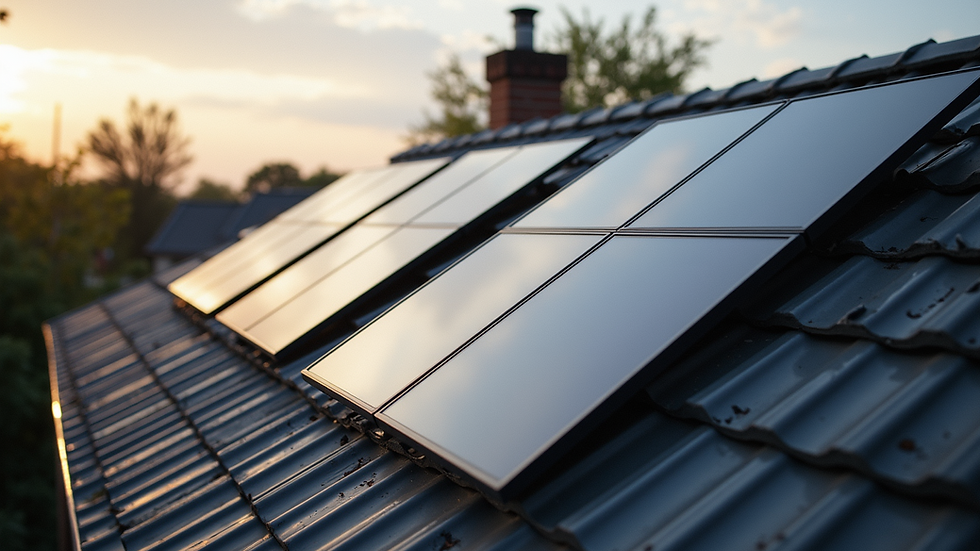How to Choose the Right Professional for Solar Projects
- Arundel Kramer
- May 19, 2025
- 4 min read
Choosing the right professional for solar projects can be daunting. With the growing popularity of solar energy, it's essential to find someone who is knowledgeable and experienced. A well-executed solar project can save you money and contribute positively to the environment. This blog post will guide you through the process of selecting the best solar professionals for your needs.
Understanding Solar Professionals
Solar professionals come in various forms, including installers, consultants, and maintenance specialists. Each plays a critical role in ensuring that your solar energy system functions effectively.
Solar Installers: These individuals or companies are responsible for installing solar panels. They handle the technical aspects and ensure everything is set up properly.
Solar Consultants: Consultants provide guidance on system selection, financing options, and how to maximize energy savings. They conduct site assessments and offer personalized recommendations.
Maintenance Specialists: After installation, these professionals are crucial in maintaining your solar system. They address any issues that arise and conduct routine inspections to ensure everything is operating effectively.

What to Look for in a Solar Professional
When selecting a solar professional, consider the following factors:
1. Experience and Reputation
Look for professionals with a solid track record and positive customer reviews. You want a trusted expert who has successfully managed projects similar to yours. Websites like Solar Reviews can provide insights into the experiences of past customers.
2. Certifications and Qualifications
Professionals should ideally have certifications indicating their expertise in solar energy. In the U.S., the North American Board of Certified Energy Practitioners (NABCEP) offers certifications for solar installers. Hiring a certified solar installer not only shows their commitment to industry standards but also assures you of their skill level.
3. Warranty Options
A good solar contractor will offer warranties on both the products they install and their labor. This shows confidence in their work and gives you peace of mind knowing you’re covered should any issues arise.

4. Transparent Pricing
Ensure you receive a detailed estimate that breaks down the costs. This should include installation, materials, permits, and any potential additional fees. Beware of low bids that seem too good to be true; often, they suggest compromises in quality or service.
5. Customer Service
Assess the professional's customer service. Are they responsive to inquiries? Do they provide comprehensive answers to your questions? Excellent customer service reflects their dedication to your project and makes collaboration much smoother.
What Certification Should You Get to Be a PV Installer?
To be a successful photovoltaic (PV) installer, acquiring the right certifications is pivotal. The NABCEP certification is one of the most recognized in the industry. It requires passing a rigorous exam and demonstrates that you have the necessary knowledge to install systems correctly.
Additional certifications, such as the Solar Energy International (SEI) courses, can further elevate your expertise. Learning about installation techniques, system design, and energy efficiency principles will prepare you for a successful career in solar energy.
Types of Certifications
NABCEP PV Installer Certification: This certifies that a solar installer has a thorough understanding of solar photovoltaic systems, ensuring quality installation and service.
SEI Solar PV Installer Training: This program covers both technical and practical elements of installation, allowing for a more comprehensive learning experience.
Manufacturer-Specific Training: Certain manufacturers provide training and certification on their equipment. This can be beneficial if you plan to specialize in particular systems.
Checking Reviews and References
Before making your final decision, conduct thorough research. Check online reviews, and ask for references from past clients. A reputable solar professional will be happy to share their experience and provide evidence of their work.
Online Reviews: Look for feedback on platforms like Yelp and Google. Pay attention to consistency in positive feedback.
References: Speaking directly to former clients can provide insight into the professionalism and expertise of the solar contractor.
When evaluating reviews, be cautious of red flags like repeated complaints about customer service or subpar installations.

Evaluating Proposals
Once you have narrowed down your options, request proposals from several candidates. Compare the following aspects to make an informed decision:
System Size and Design: Assess if the proposed system size meets your energy needs and if the design integrates seamlessly with your property.
Financial Model: Examine whether the proposal includes financing options, rebates, and incentives that can lower your installation costs.
Installation Timeline: Understand the timeline for installation and what to expect at each stage. Clear communication about start and completion dates is essential.
Aftercare and Maintenance
Once your solar project is completed, it's crucial to discuss maintenance options. Solar panels require minimal maintenance, but they should still be inspected regularly to verify their performance.
Routine Checks: Schedule annual inspections to ensure your system is functioning efficiently and to catch any potential issues early.
Monitoring Systems: Many modern solar systems come with monitoring capabilities. This allows you to track energy production and identify any anomalies right away.
Customer Support: Verify that your installer provides ongoing support after the installation. They should be available to address any questions or concerns that arise.
Final Thoughts
Selecting the right professional for your solar project can significantly impact your overall satisfaction and the efficiency of your solar energy system. By evaluating their experience, certifications, reputation, and customer service, you'll make a more informed choice.
As you consider this transition to solar energy, remember that using a quality certified solar installer will contribute to the success and longevity of your investment. Taking your time in choosing the right professionals will ensure you harness the full potential of solar energy for your needs.
Happy solar journey!




Comments